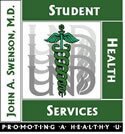|
Eating Disorders
Anorexia nervosa is an eating disorder which can lead to drastic weight loss as a result of self-imposed semi-starvation. A person with bulimia nervosa is often at normal weight but uses binge-eating and purging as a means of weight control. The number of people affected by anorexia and bulimia has increased as society has placed more emphasis on being thin and attractive. Both disorders are most common in adolescent girls and young women, but they also can occur in males and older individuals. Eating disorders are serious emotional and physical problems that can have life-threatening consequences for both females and males.
Symptoms and signs of Anorexia Nervosa include:
- Refusal to maintain body weight at or above minimally normal weight for height, body type, age, and activity level.
- Increased fear of weight gain or being fat.
- Feeling fat or overweight despite dramatic weight loss.
- Loss of menstrual periods.
- Extreme concern with body weight and shape.
Symptoms and signs of Bulimia Nervosa include:
- Repeated episodes of bingeing and purging.
- Feeling out of control during a binge.
- Purging after a binge, self-induced vomiting, laxative, diet pills, excessive exercise, etc.
- Frequent dieting.
- Extreme concern with body weight and shape.
Total recovery is possible if the disorder is diagnosed early. Left untreated, anorexia can lead to death. Treatment of anorexia involves psychotherapy, diet counseling and family counseling in most cases. Purging from bulimia depletes water and potassium from the body and can lead to death. Treatment for bulimia usually involves behavior modification, psychotherapy and, in some cases, antidepressant medication. Hospitalization may be needed in severe cases. If you are concerned that you, or someone you know, may have an eating disorder, please contact Student Health Services who will direct you where to get help. UND Counseling Center has staff who are experienced in working with clients with eating disorders. Contact the Counseling Center at 777-2127 to make an appointment.
Resource Links:
v U.S. Department of Agriculture, Food and Nutrition Information Center, Food and Nutrition Topics. (www.nal.usda.gov/fnic/etext/fnic.html)
v Health World Online, Medical Self-Care. Women's Health: Eating Disorders (Anorexia and Bulimia). (www.healthy.net/asp/templates/Article.asp?Id=1443)
v Eating Disorders Awareness and Prevention, Inc. (www.edap.org)
v Eating Disorder Referral and Information Center. (www.edreferral.com)
|
|


